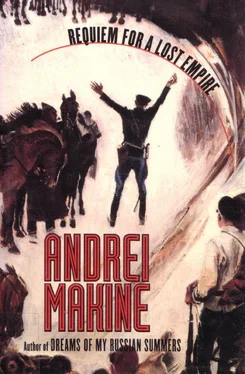"He travels all the time as a procurer, especially in Eastern Europe," explained Shakh, "but there's a chance that during the spring break he'll spend a few days with his family. You should go the day after tomorrow at the very latest. Try to see him right away. He's very suspicious. You'll say you've come on behalf of one of his best friends. I'll give you his name. This friend is currently in China on a mission, virtually incommunicado. That gives you at least four days. If he resolutely refuses all contact, mention his mistress in Warsaw. In America that can be persuasive-"
He broke off and stared at me, screwing up his eyes slightly.
"Unless you've decided quite simply to liquidate him?"
This question dogged me during the night. I did not know what I would do when I met Val Vinner. Extort a confession from him, blackmail him and so force him to justify himself at length, pitifully. See him tremble, humiliate him-or, as Shakh put it "quite simply" kill him? A pistol with a silencer, my armed hand concealed behind a map of Florida, the appearance of a lost tourist. Vinner, who is sitting in his car, agrees to help, opens the door, leans toward the map. "Yes, you're on the right road." Then he throws his head back and freezes in his seat. I lock the door and close it-he's sure to have smoked glass windows! During the course of that sleepless night there came a time when my brooding on all these methods of vengeance suddenly laid bare a hidden motive, the one I was trying to conceal from myself. In every night there comes a moment of great lucidity, of ruthless sincerity, from which one is generally protected by sleep. This time I had no protection. My thoughts were brutally exposed. There was nothing I could do against the admission that came back time and again, more and more clearly: I was going to America in the hope of hearing Vinner say that your death was not the long torment that Shakh had spoken of. That it was… an ordinary death. And that, in any case, I could not have prevented it, even if I had been at your side. That you had not suffered. That I was not answerable for this death to… To whom?
I got up to interrupt the flood of these admissions. But their sharpness now acquired the force of a living voice: "You want to see this unfrocked spy in the hope that he'll grant you absolution. Like a good old-fashioned Orthodox priest."
As the night was ending I dozed off into a sleep that retained the extreme clarity of that forced confession. But its lucidity turned into light and the edge of my grief into ice. The cold of a snowfall on a winter's day, of snow slowly chilling my brow. I saw again the wooden house you had often told me of, with its low front steps, whence one could see, beyond the fir branches, the shores of the frozen lake. After waking, I continued for a long time to experience the coolness of that day you had told me about, white and tranquil. In the aircraft, as I mentally fitted together all I knew about Vinner, playing over like chess moves all his possible reactions, I found myself from time to time far away in a fit of forgetfulness, on the shores of that lake, surrounded by the measured slumber of the snow-clad trees. At one moment, in a brief excess of grief, I thought I had grasped something which, expressed in words, faded and only told part of the truth I had sensed. "We could have lived together in that winter's day!" No, what I had just grasped went far beyond that imagined possibility. The moment I had glimpsed was shattered by words into shards of regret, remorse, hatred. I turned my thoughts once more, and with malicious joy, to the doses of mounting fear I should contrive to inject into my visits to Vinner. Then I accused myself of seeking exoneration, of secretly hoping for the account of a gentle death from him, even of wanting to kill him so as not to hear what he knew. Finally, to put an end to this verbal torture, I went back over my chess moves one by one.
I recalled that, before leaving me, Shakh had uttered this sentence, of which only the first part had seemed helpful at the time: "If you don't get a grip on him instantly, during the first ten minutes, you've lost. From what I've been told, he's an eel." The rest of his words now came back to me and seemed even more important: "But whatever happens, don't forget that for… for her, it's all the same. The die is cast." Calling these words to mind, I told myself that, ever since that walk with Shakh along a path winding around an old farm, I had had the impression of living in some obscure afterlife.
In my mind I had fashioned the town where Vinner lived out of the dark and humid stuff of the Parisian spring. I pictured the man himself dressed in an overcoat, his face clouded by rain and suspicion. Exhausted by sleepless nights, by my anticipation of our first meeting, I had not given a thought to the sun over the Gulf of Mexico. As we touched down, the light and the warm wind came surging into my imagined town, and the man in the somber overcoat was me. Traveling to Destin along the coast, I sensed the very particular atmosphere, at once carefree and nervous, of southern towns preparing for the holiday season. It could be detected in the noise made by a workman taking beach chairs out of a shed, in the smell of paint from the fresh lettering that promised a fantastic reduction for those dining early. At the hotel I rid myself of my Parisian clothes, like shameful and ridiculous witnesses beneath this clear sky.
I went out at once, not so much from fear of missing Vinner (I did not even know if he was at home) as in order to forestall a new wave of doubts. I followed Shakh's advice to go directly, without telephoning, without wasting time on normal reconnaissance in the area. Certainly the atmosphere of beach resorts, where everything is designed to lighten the load of things, contributed to the ease with which, half an hour later, I found Vinner's house on the corner of a street. Not a grayish structure, the impregnable fortress my imagination had constructed from the damp stone of Parisian apartment buildings, but a small one-story villa, set back in a garden dominated by several clumps of young palm trees. Behind the metal gate, to the left of the narrow path that led to the house, there was a parked car with an open trunk, which a man, who had his back to me, was cleaning with a small vacuum cleaner, reminiscent of a watering can. I pressed the bell. The man turned, unplugged the machine, left it in the trunk and, instead of coming toward me, which would have seemed natural, walked over to a little sentry box made of pale bricks, which stood beside the gate and was almost entirely hidden beneath the leaves of a creeper. I heard his voice very close to my ear on the intercom and at the same moment noticed the dark, flat eye of the surveillance camera. The voice was slow, thickly American. As I explained who I was, I was hardly aware of what I was saying, dazed by the comical vision I had just seen: a fifty-year-old with close-cut hair, a corpulent man rendered almost square by a white short-sleeved shirt open to his chest, this man who had been running his vacuum cleaner over the carpet in the trunk and who was now greeting my explanations with long drawn-out "Okays," this man was Val Vinner! An almost mythical being, given the evil he had wrought and the scale of what he had, negligently, destroyed, and here he was parading himself in all the banality of this little paradise beneath the palm trees, in the domestic peace of a holiday morning.
Patiently, and giving a very good imitation of the dull-witted amiability Americans devote to the explanation of details, the onetime Russian continued to question me about our mutual friend, now traveling in China, about the purpose of my visit. Suddenly what I saw beyond the gate eclipsed our conversation through the wall. A child, a boy of six or seven, walked around the car and came toward the entrance, clung to the bars, and stared at me curiously. His brother, not yet very steady on his feet, crossed the yard to join the older child. I was to learn later that the older child was the son of Vinner's wife but, seeing these two children, I felt like an emissary from a bygone age, an age since when this renegade had had the time to Americanize himself and found a family at least eight years old.
Читать дальше










